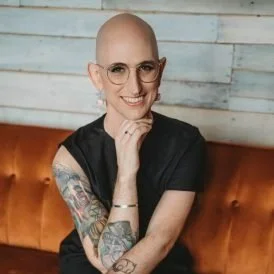
DISCO Collaborators
-

Robert Adams
UNIVERSITY OF MICHIGAN
Robert Adams is an associate professor of architecture at the University of Michigan’s Taubman College of Architecture and Urban Planning. He also teaches in U-M’s Stamps School of Art and Design and chairs U-M’s Initiative on Disability Studies. His current design interests focus on the intersection of architecture, civic infrastructure, and disability culture within a bio-psycho-socio-techo conceptual model where bodies, wearable technologies, and augmented environments coalesce. The work is aimed at sharpening architectural strategies to draw out and reconsider the efficacy of disability through advanced geometry, immersive perceptual configurations, and responsive networks. Adams’s research on design and disability culture has been published internationally, including “Chromosapiens: Reconsidering Architecture and Infrastructure within Disability Culture” which appeared in AT: Architecture Technique [China]; “Making a Scene: A Vivid Genealogy of the Asclepius Machine,” in Scapegoat: Architecture, Landscape, Political Economy: 04 Currency; and “We Are Chromo sapiens: Cánjí rén > Cánjí Cheng Shì > Canji Jiànzhú,” a book chapter in New Social Imperatives in China: Architecture & The City (Actar, 2017).
-

Toni Bushner
UNIVERSITY OF MICHIGAN
Toni Bushner's (they/she) research and pedagogy lives at the cross-section of digital humanities, technical writing, and game studies. They recently completed their doctoral thesis on how board game designers create compelling rules documentation and carry out playtesting data collection as part of the iterative design process. Outside of academia, Toni performs live glitch art for chiptune and other experimental electronic music acts under the stage name D'oh!nut.
-

Aaron Dial
COLGATE UNIVERSITY
Aaron Dial is an Assistant Professor of Film and Media Studies and African and Latin American Studies at Colgate University. Previously, he was a DISCO Network Postdoctoral Fellow at Purdue University under the Humanities and Technoscience Lab. He earned his PhD from North Carolina State University in the Communication, Rhetoric, and Digital Media (CRDM) program where his expertise is in materialist and digital media studies, digital humanities, Black studies, and cultural studies of technology and race. These areas of expertise inform his research and teaching interests, which, broadly sketched, are affective labor, popular culture, urban spaces and temporal flows, and the nexus between sports and science and technology. Currently, Aaron is working on his first monograph, Deadstock, A Philosophy of Sneakers in the Afterlife of Black Bodies, which articulates the intimate and undiscussed connections between sneakers as material objects and Black bodies.
-

Tara Fickle
NORTHWESTERN UNIVERSITY
Tara Fickle is Associate Professor of Asian American Studies at Northwestern University. Prior to joining Northwestern, she was at the University of Oregon. She received her Ph.D. from the University of California, Los Angeles, and her B.A. from Wesleyan University.
Professor Fickle’s research and teaching interests include gaming and digital culture, Asian/Asian American literature and popular culture, and comics.
Her recent book with co-editor Chris Patterson, Made in Asia/America: Why video games were never (really) about Us (Duke University Press, 2024), explores the key role video games play within the race-makings of Asia/America. Her first book, “The Race Card: From Gaming Technologies to Model Minorities,” (NYU Press, 2019, winner of Before Columbus Foundation’s American Book Award), explored how games have been used to establish and combat Asian and Asian American racial stereotypes.
-

Aria Halliday
UNIVERSITY OF KENTUCKY
Hi, I'm Aria S. Halliday, associate professor at the University of Kentucky. While research is my bread and butter, I ensure that actual great food is always close at hand. I love trying out new restaurants, experiencing diverse cuisines, and tending to my own garden while listening to the newest hip-hop album released.
As a researcher, I have been recognized as an award-winning author who specializes in the study of cultural constructions of black girlhood and womanhood in material, visual, and digital culture in the late 20th and early 21st centuries. I have published research in Cultural Studies, Departures in Critical Qualitative Research, Girlhood Studies, Palimpsest, SOULS, and forthcoming in Women, Gender, and Families of Color. I also authored Buy Black: How Black Women Transformed US Pop Culture (University of Illinois Press, 2022), Black Girls and How We Fail Them (UNC Press, 2025), and was the editor of The Black Girlhood Studies Collection (Women’s Press, 2019). Throughout my career, I have been recognized as an Institute for Citizens and Scholars Career Enhancement Fellow (2020-2021), a Donald D. Harrington Faculty Fellow at the University of Texas at Austin (2022-2023), and a 2021 Stuart Hall Foundation x Cultural Studies Award winner for my article “Twerk Sumn!: Theorizing Black Girl Epistemology in the Body.” Currently, I am an Associate Professor in the Department of Gender and Women’s Studies and program in African American and Africana Studies at the University of Kentucky working on a new project investigating Black Feminists freedom and Electric Vehicles.
-

Huan He
VANDERBILT UNIVERSITY
Huan He is an Assistant Professor of English at Vanderbilt University. He holds a Ph.D. in American Studies and Ethnicity from the University of Southern California and was recently a Postdoctoral Fellow at the University of Michigan's Digital Studies Institute. Across his projects, his research explores how racial narratives, fictions, and tropes shape—and are shaped by—the world of information capitalism. These inquiries engage many fields, including Asian American literary and cultural studies, digital studies, and critical game studies. His current book project, The Racial Interface: Asian Racialization and the Dreams of the Digital, explores why Asian Americans have been racially associated with information technologies. Using literary, cultural, and archival texts, the book shows how Asian Americans have come to represent both the nightmare of alienation and the dream of disembodied freedom, two powerful fictions that shape our digital present. He is also pursuing a second research project at the intersection of race and digital gaming. His scholarly work appears/is forthcoming in Configurations, College Literature: A Journal of Critical Literary Studies, Media-N, and an anthology on Asian American game studies. He is also a poet, whose work can be found in Poetry, Sewanee Review, A Public Space, Beloit Poetry Journal, and elsewhere.
-

Michelle Huang
NORTHWESTERN UNIVERSITY
Michelle N. Huang is Assistant Professor of English and Asian American Studies at Northwestern University.
She received her Ph.D. in English and Women's, Gender, and Sexuality Studies from the Pennsylvania State University in 2017. She also holds a M.A. in English (Penn State) and B.A.s in English and Economics (NYU).
Her research interests include Asian American literatures, posthumanism, and feminist science studies.
Michelle’s articles have appeared in American Literature, Journal of Asian American Studies, Amerasia, Contemporary Literature, Twentieth-Century Literature, the Oxford Research Encyclopedia of Literature, and Journal of Medical Humanities. Her public writing can be found at Lateral: Journal of the Cultural Studies Association and Post45: Contemporaries.
-

Brandi Pettijohn
SPELMAN COLLEGE
Dr. Brandy Pettijohn 's scholarship focuses on ethical digital storytelling for cultural sites, creating a framework called Black feminist technopractice. Grounded by Black feminist theory, Black feminist technopractice is an interdisciplinary digital humanities framework for digital storytelling and interactive narratives that deploys what we know as participatory design and speculative design {making with marginalized users in mind, while being expansive in the imagination of what we believe design can do}, combined with art and archival practices {expanding the archive beyond normal institution spaces} while leveraging Black technoculture {examining how Black people make meaning in digital spaces}. Brandy’s research areas include, Black Digital Visual Culture, Black Feminist World Making, and Digital Storytelling.
-

Melvin Villaver
CLEMSON UNIVERSITY
Melvin Earl Villaver, Jr., Ph.D., is an expert in Hip Hop's cultural origins and the role of African American artists in music history. Since Fall 2023, he has been an assistant professor at Clemson University, blending practical skills in music production with scholarship.
Driven by a commitment to celebrating Black music, Villaver's research focuses on Blues Epistemology and Black musicians' artistry. He explores how modern trends elevate Hip Hop and aims to preserve these cultural narratives. His goal is to highlight Black music's role in history and inspire future scholars and musicians.
-

Kevin Winstead
UNIVERSITY OF FLORIDA
Dr. Kevin C. Winstead is an Assistant Professor of Critical Media and AI Studies within the African American Studies and Sociology Departments at the University of Florida. His research focuses on critical information studies, social movements, and digital media, specifically on transglobal disinformation. His work can be found in Ethnic and Racial Studies, Sociology Compass, and Critical Intersections in Contemporary Curriculum & Pedagogy, Information Age Publishing.
-

Lida Zeitlin-Wu
UNIVERSITY OF NOTRE DAME
Lida Zeitlin-Wu is an interdisciplinary Humanities scholar working at the intersection of media theory and history, STS, critical race studies, and visual and material culture.
Originally trained in modern languages, she now researches the rationalization and commodification of sensory experience and personhood—particularly color—under technocapitalism. Her current book manuscript, How Color Became a Technology: The Making of Chromatic Capitalism, tracks the transformation of color from an ephemeral concept into a sophisticated technology, beginning with 19th-century mass standardization and culminating in today’s privatized digital landscape. Her work appears or is forthcoming in Visual Studies, Camera Obscura, Frames Cinema Journal, Adaptation, and elsewhere, and with Carolyn L. Kane, she is the co-editor of Color Protocols: Technologies of Racial Encoding in Chromatic Media (MIT Press, 2025).
Dr. Zeitlin-Wu is currently an Assistant Professor in the Department of Film, Television, and Theatre at the University of Notre Dame. She holds a PhD in Film & Media from UC Berkeley and was most recently a Postdoctoral Research Fellow in the Digital Studies Institute at the University of Michigan.